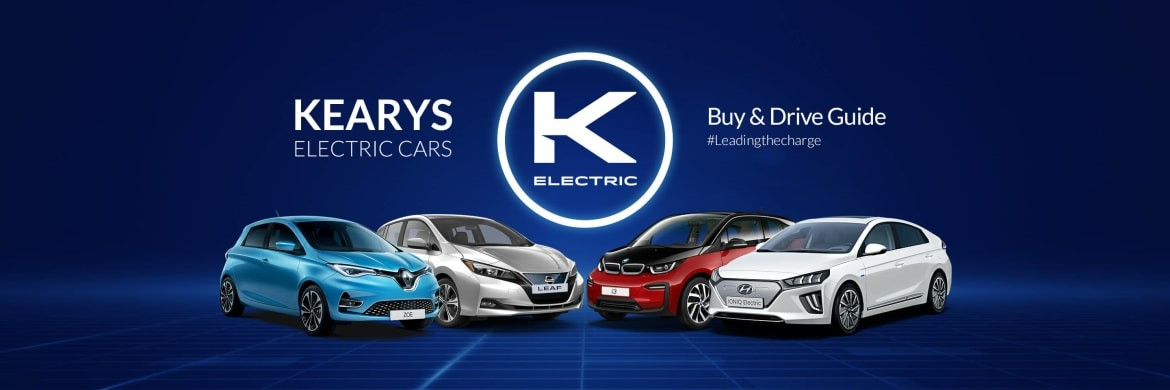How to charge

The charging of an electric vehicle will be one of the biggest differences for people who are used to refuelling a petrol or diesel car. There is a number of factors that go into the charging a electric vehicle including the power rating, connector type, cabling requirements & vehicle specification. All EVs measures their power in kilowatts (kW).
There are a number of different types of charging options available:
1: Home charging - 6-8 hours
2: Public charging (Standard AC) - 1-9 hours depending on car model and range
3: Fast charging (DC) - 30* minutes to achieve an 80% charge
4: High Power Charging - 100km range in as little as 6 minutes
*Due to different types and battery sizes of EVs, these times may vary.
At home where an overnight full charge can cost as little as €3 or out and about at the various networks available on garage forecourts, car parks, shopping centres and on street across Ireland. Charging times and cost can vary depending on the type of battery and charger used. Standard chargers can charge your car in 1 - 9 hours again depending on battery and car type.
HOME CHARGING
Plugging your hybrid or electric vehicle in at home is a simple and effective way to ensure it’s ready to go when you need it. Simply connect your vehicle to a standard domestic socket and leave it to charge. This isn’t the fastest way to charge the battery because of the limited power availability from household sockets.
PUBLIC & DESTINATION CHARGING
Across the range of our all-electric and plug-in hybrid vehicle portfolio, we will provide public charging cables either as standard or as an accessory depending on the model that's right for you.
TYPES OF EV CHARGERS
There are three main types of charging – rapid, fast & slow. These represent the power outputs and therefore charging speeds.

Rapid chargers are one of two types – AC or DC (Alternating or Direct Current). As of today Rapid AC chargers are rated at 43 kW, while most Rapid DC units are at least 50 kW. Both will charge the majority of EVs to 80% in around 30-60 minutes (depending on the battery capacity).
Fast chargers include those which provide power from 7 kW to 22 kW, which typically fully charge an EV in 3-4 hours. Common fast connectors are a tethered Type 1 or a Type 2 socket (via a connector cable supplied with the vehicle).
Slow units (up to 3 kW) are best used for overnight charging, which is commonly used at home charging. This form usually takes between 6 and 12 hours for a pure-EV, or 2-4 hours for a PHEV. EVs charge on slow devices using a cable which connects the vehicle to a 3-pin or Type 2 socket.

RANGE ANXIETY
Making the switch from fossil fuels to an all electric power car is one that takes consideration. That makes sense as you weigh up all the factors such as charging, emissions, road tax and fuel costs. All the while remembering as well as being sustainable, Electric Vehicles are cleaner, cheaper to run and great fun to drive!
But is an electric car or electric vehicle for me you might ask. This will change person to person and is very dependant on their individual needs and driving circumstance. For example if you travel long distances on the motorway an EV might not be for you just yet but equally if you travel in a suburban/ city area from home to work and back daily you can find yourself saving money weekly.
Our manufacturers have invested seriously in research and development and we at Kearys are very excited about our new models for 2020, with larger battery capacity and greater range, which will go a long way to reducing anxiety.
We recommend home charging and are able to advise on the best suppliers and installers in your area. Grants are available from the government to assist with getting a home charger installed and there is an ever growing presence of public chargers becoming available.
So why not contact Kearys for a test drive and we’ll be happy to help you with any questions you may have.

CHARGING LOCATIONS MAP
1,100 ESB Charge Points
The ESB operates over 1,100 electric car charge points across Ireland currently and this number is growing every month. Click the button button below to see the map. From there you can filter the map by the type of chargers available like combo CCS, Type 2, AC43 and CHADeMO.
You can also download the ecar connect app from the Apple store and Google play store to help you locate your nearest charger.
In addition to these charge points there is new power point providers entering the market which is increase both the number of chargers and the level of coverage they provide across the country.